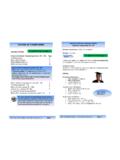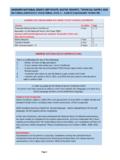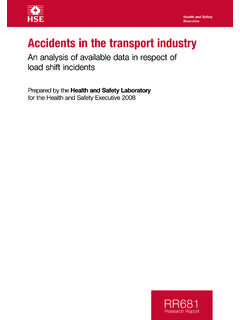Transcription of DAM TECHNICAL COLLEGE
1 O National Certificate: Professional DrivingSAQA Qualification ID 50285 NQF Level 3 ENTRANCE REQUIREMENT Grade 10, FETC Level 2 or equivalent Mathematical Literacy and Communication competence. o Duration : 1 Year PURPOSE AND RATIONALE OF THE QUALIFICATIONP urpose: The purpose of the qualification is to ensure competent professional driving competence in the road transport sector, thus improving earning capacity of professional drivers as well as transport sector professionalism and economic growth.
2 The qualification is set to create an environment for growth and development of learners, by improving the employment prospects and marketable competence of drivers, and accelerating the redress of past unfair discrimination in education, training and employment opportunities. By setting the minimum standards contained in this qualification, professional driving education and training will also improve. The professional status of drivers of commercial vehicles will be enhanced by awarding a formal qualification in recognition of their professional competence. This qualification is designed to allow maximum access to, mobility and progression within education and training, and within a career path in the transport sector.
3 Competence achieved in this qualification provides building blocks towards NQF level 4 qualifications, and the inclusion of communication and language, and mathematic literacy requirements contributes to learner development beyond simply the requirements for professional driving. Qualified learners are capable of: Obtaining and communicating road transport operational information. Assessing loads against given permissible load requirements. Planning road transport service delivery that meets specified requirements. Driving a vehicle conveying a specific freight commodity or category of passengers. Qualified learners also elect to achieve at least one of the following specialisations: Using computerised spreadsheets and word processing.
4 Planning the establishment of a small business according to relevant business principles. Conducting vehicle maintenance according to specified procedures. Operating lifting equipment according to specified procedures. DAM TECHNICAL COLLEGECAMPUSES: BRAAMFONTEIN Tel: (011) 339 4016 Fax :(011)3394679 PRETORIA Tel: (012)326 0247 Fax: (012)326 0267 REGISTRATION AND AFFILIATION: o Register of companies Ref 2003/019999/07 o DHET Provisional Reg. No. 2008/FE07/018 o UMALUSI REF. FET00018PA o MICT SETA LPA No. 01000876 o QCTO NATED/14/0078 Rationale: Learners credited with this qualification are working, or intend working, in the commercial road transport industry as drivers.
5 This qualification builds on light vehicle driving competence, and credits competent drivers, who are driving vehicles carrying freight or passengers for commercial purposes. The demand for this qualification lies primarily in the transport industry 's requirement for drivers to have employable competence beyond that of a basic driving license and professional driving permit. Currently, more than 7000 individuals work in the sector that would benefit from this qualification. Learners can be persons entering the sector, persons already working in the sector as drivers, persons already working in the field in a non driving capacity, and/or self employed persons within the sector.
6 There is a critical need in the industry to recognize learner competence regarding professional driving, and to ensure that legal requirements are adhered to. In South Africa, the transport industry is experiencing a shortage of competence in and good training for professional driving. Direct costs of poor driving include human and economic costs. Improved professional driving could influence the South African economy in direct transport , social and economic costs alone to the value of millions of Rands each year. By improving professional driving competence, road safety is improved and social and economic costs associated with road accidents are decreased.
7 INTERNATIONAL COMPARABILITY Many countries implement training programmes according to standards set by The International Road transport Union (IRU), a world wide organisation representing the operators of trucks, buses and taxis through its network of 156 members in 66 countries. Member countries include: Albania; Argentina; Armenia; Austria; Azerbaijan; Bahrain; Belarus; Belgium; Bosnia Herzegovina; Brazil; Bulgaria; Canada; Chile; Croatia; Cyprus; Czech Republic; Denmark; Estonia; Finland; France; Georgia; Germany; Greece; Hungary; Iran; Ireland; Israel; Italy; Japan; Jordan; Kazakhstan; Kuwait; Kyrgyz Republic; Latvia; Lebanon; Lithuania; Luxembourg; Macedonia, former Yugoslav Republic of; Malta; Moldova; Mongolia; Morocco; Netherlands; New Zealand; Norway; Pakistan; Peoples Republic of China.
8 Poland; Portugal; Republic of Korea; Romania; Russia; Serbie et Montenegro; Slovakia; Slovenia; Spain; Sweden; Switzerland; Syria; Tajikistan; Tunisia; Turkey; Turkmenistan; Ukraine; United Arab Emirates; United Kingdom; United States of America; Uruguay; Uzbekistan. The IRU established training standards for a Certificate of Professional Competence for professional driving (CPC for National and International Road Haulage and Passenger transport ). Four modules are included, namely international road haulage, national road haulage, international passenger transport , and national passenger transport .
9 The IRU requires the following components in all accredited programmes: Civil Law, including contracts, contract negotiations, claims, and the CMR Convention. Commercial Law, including business organisations and legal obligations, constitution and operation and dissolution of commercial companies. Social Law, including codes of practice in industrial relations, role and function of various social institutions (trade unions, arbitrators, government agencies, etc.), rights of employers and employees, social security legislation, employment law and industry codes of practice, driving and working time regulations.
10 Fiscal law, including motor vehicle tax, infrastructure user charges, tolls and taxes, corporate and personal income tax, double taxation, international and national rules on VAT. Business and financial management of the undertaking, including payments, bank credit, guarantee deposits, mortgages, leases, hire purchase, content and layout of balance sheets, profit and loss account assessment of undertakings profitability and financial standings, budgets, financial ratio analysis, cash flow management and cost management, organisational structure, work planning, marketing and public relations, financial risk management and insurance, electronic data transmissions, GPS utilisation, route and load planning, invoicing, quotations, Incoterms, strategic partnerships.










